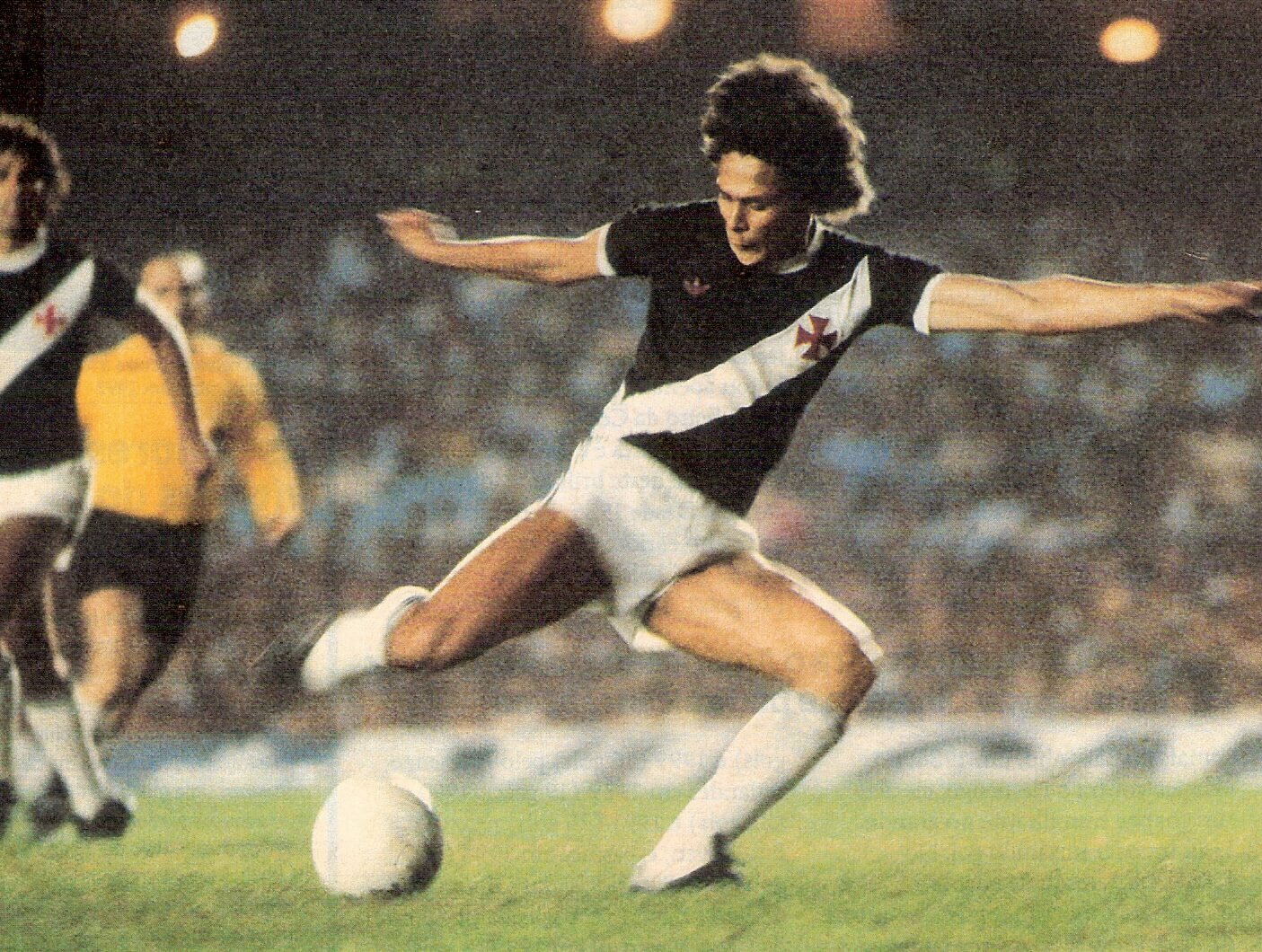history | 2015-09-02
The story of Roberto Dinamite at Barcelona
The Vasco legend and one of the greatest Brazilian strikers ever
On December 16th, 1979, Barça lost at San Mamés 2-1 against Athletic Club. Carlos and Goikoetxea sentenced the fifth defeat in thirteen matches, which left the blaugrana team in tenth place on the table, nine points behind the joint leaders Real Madrid and Real Sociedad and just two points more than Burgos, the first team in relegation zone. The crisis, usual at the Camp Nou, nearly ran over Quimet Rifé and had already doomed Hans Krankl. Heroes seven months earlier in Basel, the coach and the scorer personified the sinking of Josep Lluís Núñez’s second project, so, in a silent and swift operation in late December that year, Barça closed a stratospheric deal for the ideal ‘number 9’ in Brazil, the most reputed scorer in the country, and the man that would lead the resurgence of the team. His name is Carlos Roberto de Oliveira, a.k.a. “Roberto Dinamita (Dynamite)”.
Dinamite’s short experience at Barça is summed up in ten matches, three goals, many critics and a loss for the club that approached 30 million pesetas, which wasn’t a small amount. All this in just seven weeks. Madness.
Football was more local than it is today; watching a match from English or Italian Leagues wasn’t precisely common and discovering someone from Brazil was almost a miracle, the landing of the biggest scorer of the decade for Vasco da Gama was greeted in Barcelona with as much expectations (for his theoretical role of savior) as skepticism. It was an addition that took everyone by surprise, which was announced by Joan Gaspart as a Christmas present in the afternoon of January 3rd, 1980. The next day, Sport and Mundo Deportivo both displayed the signing in their covers as an $800,000-worth bomb (over 56 million pesetas) and that he was called to finish the hegemony of Real Madrid, which had won four out of the five previous Liga titles. The other one was conquered by Atlético.
“I’m madly happy about my signing” and “I’ll score many goals at Barcelona” were the quotes with which Roberto Dinamite presented himself at Barcelona. He arrived on Friday, January 4th and, the next day, he suddenly understood what the pressure was at Barça. Gaspart took him to the Palau Blaugrana to see how Lolo Sáinz’s Real Madrid basketball team beat Antonio Serra’s team by 89-102, with 32 points from Raga Rullán, which nullified the 29 from Chicho Sibilio. A day later, with Esteban as striker, Barça couldn’t get more than a 0-0 at Vallecas. The following week, the derby at Sarrià destroyed the blaugrana team, kneeled down by goals from Marañón and Arabí. And on January 20th, a Sunday of polar cold in Barcelona, the moment of truth arrived. Almería, First Division debutant, visited the Camp Nou at 5:00 pm. And Roberto Dynamite did what was asked. Barcelona won by 2-0 and both goals had his name: first one from a penalty, at 79’ and with unseen coldness, almost walking and sitting the goalkeeper César before scoring calmly; the second, in stoppage time with a shot from the line of the box that misled the keeper by bouncing off a defender. He offered no brilliance, but he delivered.
Since then, however, everything that was expected from the Brazilian scorer turned into a major disappointment. Unnoted in the victory against Zaragoza and invisible at Nottingham, in the first leg of European Supercup, when the team of the legendary Brian Clough defeated Barça, Roberto started to be the target of criticism at the next match, in the Liga defeat at Sevilla against Betis that left Rifé’s team, after 19 matchdays, in eighth place along with Espanyol and ten points behind the leader, Real Sociedad. Two days later, Roberto scored his third and last goal, a penalty, against Forest in the second leg of the continental Supercup, but his figure, shrunk by cold, was already ghostly for some fans that, day after day, read merciless criticism towards him on the papers.
It was five days later when crisis gave way to collapse. For Roberto Dinamite, for Rifé, and for Barça. The common yearly scenario of downfall matched the visit of Real Madrid, who assaulted Camp Nou 0-2 with an exhibition from an Englishman called Laurie Cunningham, whose discrete journey through the white club was forgiven for that afternoon in which the last applause for a madridista at the culé temple was heard. He participated in the next 180 minutes at Salamanca facing Real Sociedad and, on March 2nd, at Alicante against Hércules, the coach, already sentenced, subbed him at half-time. “This boy is awful”, one could read in the next day’s papers referring to him. On March 5th, Valencia also won at Camp Nou in the first leg of Recopa’s quarterfinals (without the Brazilian, he was not registered) and a day later Joaquim Rifé was fired to be replaced by Helenio Herrera.
Roberto’s story at Barça ended the following Sunday, with a sad, goalless tie at the Estadi and Herrera shamelessly pointing towards the Brazilian, while subbing him at 63’ in the middle of jeers from a fandom that had already sentenced him, who read on a daily basis about Krankl’s resurrection in Austria and contemplated how Núñez’s triumphant project dragged itself in the ninth position, 14 points behind Real Sociedad and Real Madrid. On Wednesday, March 12th, Barça was bruised at Atocha by Real Sociedad in the Cup (3-0) and Roberto Dinamite took the road back to Brazil for 27 million pesetas.
His return was tremendous. After getting back in shape and playing two meaningless matches with Vasco da Gama, on May 5th, at the Maracanã, he faced Corinthians. Vasco won by 5-2… and all five goals had the name of Roberto Dynamite. A living legend at the Rio de Janeiro club, he’s still their top scorer ever with 689 goals and the player with most caps: 1110 matches. An unquestionable idol who passed through Barça like a simple ghost.
Two years later, in an operation as extraordinary as they were back them in the club, the next Brazilian arrived, Cleo was his name and his presence at Barcelona, costing 15 million pesetas, was less than testimonial, with a friendly match, rumors about his homosexuality, his lightning wedding and the return to Internacional de Porto Alegre. Stories of Brazilians that didn’t settle or did it discreetly like Aloisio, signed after the Seoul Olympics… Five years passed until, finally, a Brazilian scorer proved his class dressed in blaugrana. His name was Romario and his idol, curiously enough, answered by the name of Carlos Roberto de Oliveira… Commonly known as Roberto Dinamite.
Anything wrong? Send your correction.

Article translated from Spanish to English, originally published at the Perarnau Magazine. Martí Perarnau is one of Grup 14's partners.
WRITTEN BY: Perarnau Magazine
The



 Barcelona News 24/7
Barcelona News 24/7